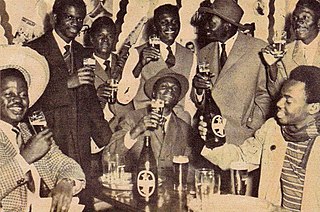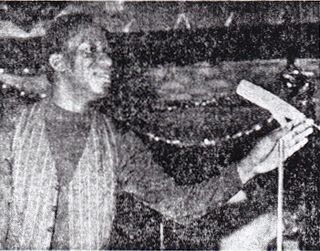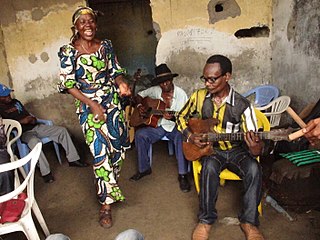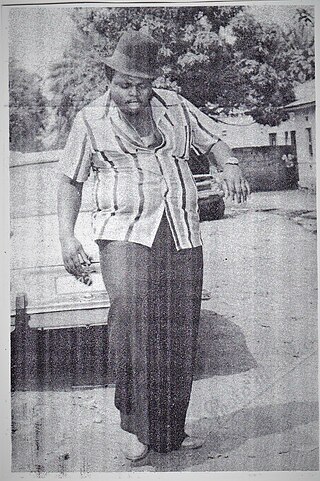Related Research Articles

Congolese music is one of the most influential music forms of the African continent. Since the 1930s, Congolese musicians have had a huge impact on the African musical scene and elsewhere. Many contemporary genres of music, such as Kenyan Benga and Colombian Champeta, have been heavily influenced by Congolese music. In 2021, Congolese rumba joined other living traditions such as Jamaican reggae music and Cuban rumba on UNESCO's "intangible cultural heritage of humanity" list.

Soukous is a genre of dance music originating from the Democratic Republic of the Congo and the Republic of the Congo. It derived from Congolese rumba in the 1960s, with faster dance rhythms and bright, intricate guitar improvisation, and gained popularity in the 1980s in France. Although often used by journalists as a synonym for Congolese rumba, both the music and dance associated with soukous differ from more traditional rumba, especially in its higher tempo, song structures and longer dance sequences.

Ibrahima Sylla was a Senegalese record producer born in Ivory Coast and founder of the African music label Syllart Records. He was an internationally acclaimed musician whose production and music direction defined popular African music. From West African dance, to Congolese Soukous, to melodic griot-led songs, Sylla's signature as a music producer is unmistakable. He has demonstrated his familiarity with many contemporary African musical genres, and he has worked with most of Africa's musical greats.

OK Jazz, later renamed TPOK Jazz, was a Congolese rumba band from the Democratic Republic of the Congo established in 1956 and fronted by Franco. The group disbanded in 1993, but reformed in 1996.

Pascal-Emmanuel Sinamoyi Tabu, better known as Tabu Ley Rochereau, was a leading African rumba singer-songwriter from the Democratic Republic of the Congo. He was the leader of Orchestre Afrisa International, as well as one of Africa's most influential vocalists and prolific songwriters. Along with guitarist Dr Nico Kasanda, Tabu Ley pioneered soukous and internationalised his music by fusing elements of Congolese folk music with Cuban, Caribbean and Latin American rumba. He has been described as "the Congolese personality who, along with Mobutu, marked Africa's 20th century history." He was dubbed "the African Elvis" by the Los Angeles Times. After the fall of the Mobutu regime, Tabu Ley also pursued a political career. His musical career ran parallel to the other great Congolese rhumba bandleader and rival Franco Luambo Makiadi who ran the band TPOK Jazz throughout the 1960s, 1970s and '80s.

Nyboma Mwan'dido, often simply Nyboma, a prominent Congolese soukous tenor vocalist, has been over a fifty-year span a leading member of several outstanding bands, including Orchestre Bella Bella, Orchestre Lipua Lipua, Orchestre Kamale, Les Quatre Étoiles, and Kékélé, in addition to performing and recording as a solo artist. He is widely recognized as one of the best singers in Congolese music.

Congolese rumba, also known as African rumba, is a dance music genre originating from the Republic of the Congo and Democratic Republic of the Congo. With its rhythms, melodies, and lyrics, Congolese rumba has gained global recognition and remains an integral part of African music heritage. In December 2021, it was added to the UNESCO list of intangible cultural heritage.

Pépé Kallé, sometimes written as Pepe Kalle was a Congolese soukous singer, musician and bandleader.
Orchestra Makassy were an East African soukous band of the late 1970s and early 1980s, consisting of musicians from Uganda and Zaire.
Mose Se Sengo was a guitarist, composer and band-leader from the Democratic Republic of Congo. He was one of the pioneers of Congolese Soukous.
Empire Bakuba is an influential soukous band that formed in Zaire in 1972. The name of the band refers to the Bakuba Kingdom; it is sometimes reported as Empire Bakuba du Grand Kalle, in honor of Grand Kalle, the "father of Congolese music", who was also bandleader Pepe Kalle's mentor. The band has never formally disbanded, although its activity has been scarce since Pepe Kalle's death.
Gaspard Wuta Mayi, commonly known as Wuta Mayi, is a Congolese rumba and soukous vocalist and composer from the Democratic Republic of the Congo (DRC). From 1974 to 1982, he was a member of the band TPOK Jazz, led by Franco, which dominated the Congolese music scene from the 1960s through the 1980s. Since leaving TPOK Jazz he has recorded and performed as a solo artist, in addition to being one of the four members of the "supergroup" Les Quatre Etoiles, and subsequently a member of Kékélé.

Isaac Musekiwa was a Congolese rumba recording artist and saxophonist, in the Democratic Republic of the Congo (DRC). He was once a member of the soukous band TPOK Jazz, led by François Luambo Makiadi, which dominated the Congolese music scene from the 1950s through the 1980s.
Empompo "Deyesse" Loway, was a Congolese soukous recording artist, composer and saxophonist. He was a member of the soukous band TPOK Jazz, led by Franco Luambo, which dominated the Congolese music scene from the 1950s through the 1980s.
Papa Noel Nedule is a soukous recording artist and guitarist in the Democratic Republic of the Congo (DRC).
Kekele was a band formed in 2000, composed of leading veteran African musicians, mostly from the Democratic Republic of the Congo. They played Congolese rumba in a revival style harkening back to the 1950s, 60s, and 70s, using acoustic guitars. Kekele seems to be dormant or defunct, having not released a recording since 2006 nor performed since (apparently) 2010.
Bopol Mansiamina, also known as Bopol or Don Paolo, was a prolific and renowned Congolese musician. He recorded and performed extensively over four decades as a solo artist, as a member of leading African bands, and in support of many African musicians. Bopol was best known for his work in the 1980s and early 1990s as one of the four members of the Paris-based supergroup Les Quatre Etoiles and as a solo artist.
Syran Mbenza is a guitarist, originally from the Democratic Republic of the Congo, who has lived in Paris since about 1981. He has recorded and performed prolifically over five decades, including as a solo artist; as one of the four members of the popular soukous "supergroup" Les Quatre Étoiles; as a founding member of the acoustic, Congolese rumba revival band Kékélé; in other bands; and in support of numerous artists. He has been described as one of the greatest guitar players of Africa.
Defao was a Congolese singer-songwriter. He was a member of the prominent soukous groups Grand Zaiko Wawa and Choc Stars.
References
- ↑ Also known as Quatre Etoiles du Zaire, Quatre Etoiles, 4 Etoiles, 4 Stars, versions with or without the accent on the E, etc.
- 1 2 Bessem, Frank. "Les Quatre Etoiles (The Four Stars)". Frank Bessem's Musiques d'Afrique. Retrieved 7 August 2017.
- ↑ "Les Quatre Étoiles - Biography & History". AllMusic. Retrieved 7 August 2017.
- 1 2 Stewart, Gary (2000). Rumba on the River : a History of the Popular Music of the Two Congos . Verso. ISBN 1-85984-744-7.
- 1 2 3 "Quatre Etoiles (Four Stars)". Rumba on the River: website of the book. Retrieved 3 May 2019.
- ↑ Smith, C.C. "Syran Mbenza". African Musicians Profiles. Retrieved 8 August 2017.
- ↑ Christgau, Robert. "Mose Fan Fan & Somo Somo Ngobila". www.robertchristgau.com. Retrieved 7 August 2017.
- ↑ "Hello Hello". amazon.com. Stern's. 7 June 1996. Retrieved 7 August 2017.
- ↑ "Mose Fan Fan & Somo Somo - Hello Hello 1995". World News. Retrieved 7 August 2017.
- ↑ Pareles, Jon (3 February 1990). "Review/Pop; Modern Soukous of Zaire By Three of Four Etoiles". The New York Times. Retrieved 4 May 2019.
- 1 2 "4 Etoiles - Zairean Stars Show In The US - Kilimanjaro Heritage Hall". Discogs. Retrieved 4 May 2019.
- ↑ "African music and European World Music Festivals 2010". Frank Bessem's Musiques d'Afrique. Retrieved 7 August 2017.
- ↑ "4 Etoiles, "Double Double" - AFH493". Afrikafestival Hertme site on Youtube. 13 February 2014. Archived from the original on 2021-12-21. Retrieved 7 August 2017.
- ↑ "Afrikafestival Hertme 2010 - 4 Etoiles part 1". Ton Kraayenvanger on Youtube. 25 October 2010. Retrieved 7 August 2017.[ dead YouTube link ]
- ↑ "Bozar à Bruxelles: 'African Gospel Day' et concerts de rumba acoustique". Congo Forum. Retrieved 7 August 2017.
- ↑ "Quatre Etoiles - Afro Rythmes Présente 4 Grandes Vedettes de la Musique Africaine". Discogs .
- ↑ "Quatre Étoiles* - 4 Super Etoiles". Discogs .
- ↑ "4 Stars Etoiles* - Dance". Discogs .
- ↑ "Quatre Étoiles* - 6 Tubes / 6 Hits". Discogs .
- ↑ "6 Tubes, Quatre Etoiles (4 Etoiles ou 4 Stars)". Afrisson.
- ↑ "Les 4 Étoiles* - les 4 Étoiles". Discogs .
- ↑ "4 Étoiles - Sangonini". Boomkat.
- ↑ "Quatre Etoiles - Adama Coly". Discogs .
- ↑ "Live in London - Quatre Etoiles du Zaire". CDBaby.